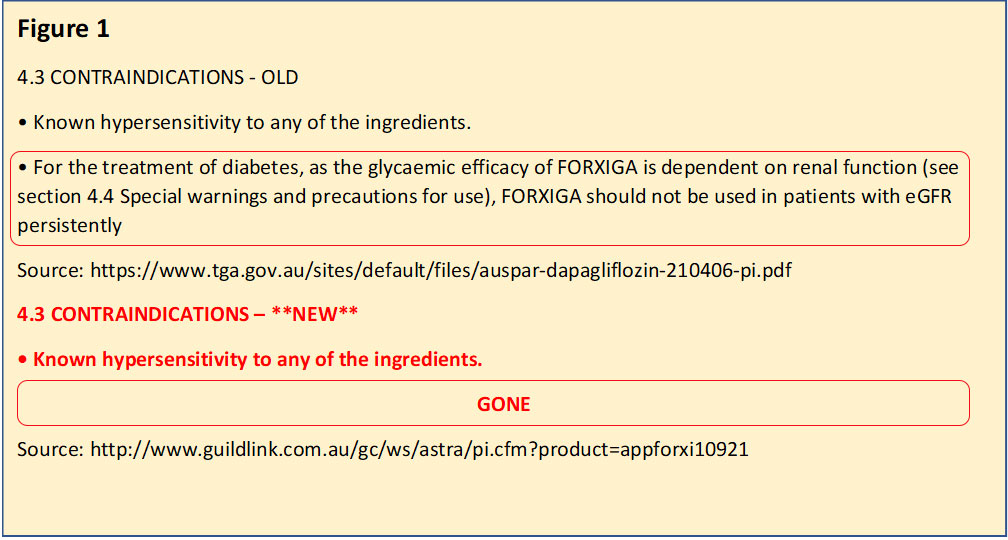25th September 2021, Dr Chee L Khoo

SGLT2 inhibitors (SGLT2i) have been shown to improve outcomes in patients with type 2 diabetes (T2D) and high cardiovascular risks as well as in patients with chronic kidney disease and heart failure regardless of diabetes status and independently of blood glucose levels or HbA1c. There is a little bit of a “catch” though, the eGFR. Some of the SGLT2i are not recommended if the eGFR is < 45 mL/min/1.73m2 while others only had to be stopped if the eGFR <30 mL/min/1.73m2. The line drawn used to be < 60 mL/min/1.73m2. Now that line has changed again. It’s only a small change but the change has major implications in how we used this class of medication.
eGFR and glucose lowering effect of SGLT2 inhibitors
One of the many actions of the SGLT2i is reducing plasma glucose. They blocked the reabsorption of glucose from the renal tubules causing glycosuria. This leads to reduction in plasma glucose. Of course, SGLTi are very dependent on glomerular filtration. The lower the eGFR is, the lower the potency is in their glucose reduction capability. They don’t harm kidneys which have low eGFR. They just don’t reduce plasma glucose as much. You will need to rely on other agents to do the rest of the work in reducing plasma glucose.
Cardiovascular outcome trials (CVOTs)
I mentioned that glucose reduction is just one of the many actions of the SGLT2i. The landmark cardiovascular outcome trials (CVOTs) demonstrated the SGLT2i are associated with significant reduction in major adverse cardiovascular events (MACE) especially for hospitalisation for heart failure (1-4). Because the beneficial effect is seen very early at around the 3 months mark, it is thought the CV benefits is not likely to have come from the glucose reduction or diuresis effect of the SGLT2i. It is thought that the SGLT2i lead to change in myocardial fuel utilisation – from glucose utilisation to fatty acid utilisation. I liken it to the difference between E10 petrol and 98 petrol. The myocardial pumps better with better fuel.
Dedicated heart failure trials
The CV benefits seen in pretty much all the CVOTs of the SGLT2i were mostly in the heart failure component of the composite MACE outcomes. Dedicated heart failure outcome trials have since confirm that SGLT2i reduce hospitalisation for heart failure and cardiovascular mortality irrespective of whether the patient have diabetes or not (5-7). The benefit is especially stark in patients who already have heart failure as well as in patients who already have established cardiovascular disease.
Dedicated renal trials
Different SGLT2i have different eGFR thresholds below which the Therapeutic Goods Administration (TGA) recommend against using those agents in the management of hyperglycaemia in patients with T2D. This has nothing to do with any potential harm to those patients with reduced eGFR. It’s all about the glucose reduction efficacy once eGFR is reduced. This peculiar situation arose because of the different baseline eGFR of the participants in the different studies and the TGA can only approved the agents according to what eGFR were in the studies.
In dedicated renal outcome trials, SGLT2 inhibitors not only reduced the risk of kidney failure and prolonged the survival in patients with CKD, they reduce death from cardiovascular causes or hospitalisation for heart failure in patients with chronic kidney disease, with or without type 2 diabetes, independently of the presence of concomitant cardiovascular disease (8,9). Patients in those trials have eGFR as low as 25 mL/min/1.73m2.
So, what has changed?
The TGA has a minimal eGFR threshold when we initiate a patient on an SGLT2i. It has to be at least 45 mL/min/1.73m2. As mentioned, this relates to the glucose reducing capacity of the SGLT2 inhibitor below that level. The TGA used to suggest that once the eGFR drops below 45 mL/min/1.73m2, an SGLT2 inhibitor is contraindicated.
That contra-indication has just been removed for dapagliflozin (see Figure 1). It is no longer contra-indicated for patients with low eGFR of any number. While we still need to have an eGFR > 45 mL/min/1.73m2 when we initiate dapagliflozin, we don’t have to worry as times goes along and the eGFR drops lower as the diabetes disease progress. The CV and renal benefits are still there at those low eGFR levels. We don’t have to abandon dapagliflozin because one of the many reasons we have a patient on dapagliflozin is not only does it help reduce plasma glucose but it has significant cardiovascular and renal benefits. Remember, patients with CKD (low eGFR) have high CV mortality and morbidity risks in addition to risk of renal progression. They should be on an SGLT2 inhibitor unless there are reasons not to.

Interestingly, the Pharmaceutical Benefits Schedule (PBS) do not have any eGFR restriction when we choose an SGLT2 inhibitor. The PBS subsidises these hypoglycaemic agents if the HbA1c is > 7.0%. Even that is a little behind the available data. CV and renal benefits were seen in patients irrespective of glycaemic status. As we know, the PBS is always behind and will catch up soon.
It’s been at least 6 years since EMPA-REG first reported on the positive CV outcomes of empagliflozin. This was followed by similar findings with DECLARE-TIMI 58 (Dapagliflozin), CREDENCE (Canagliflozin) and VERTIS-CV (Ertugliflozin) confirming that the cardiovascular and renal benefits are probably class wide and independent of glucose reduction efficacy. These studies have led to a complete paradigm shift in the way we manage type 2 diabetes. We are no longer looking at glucose reduction alone.
The joint EASD/ADA hyperglycaemia management guideline was changed many years ago to reflect this paradigm change. We MUST look at the presence or absence of cardiovascular and/or renal complications when we choose our next agent after metformin. Yet, the message is still not getting through. We are still seeing patient after patient with T2D who have high cardiovascular risks (with or without established CV events) and/or chronic kidney disease who are only on metformin and sulphonylurea. They may or may not be on a DPP4 inhibitor which does NOT have CV or renal benefits. Are you one of those GPs?
References:
- Zinman B, Wanner C, Lachin JM, et al. EMPA-REG OUTCOME Investigators. Empagliflozin, Cardiovascular Outcomes, and Mortality in Type 2 Diabetes. N Engl J Med. 2015 Nov 26;373(22):2117-28. doi: 10.1056/NEJMoa1504720. Epub 2015 Sep 17. PMID: 26378978.
- Wiviott SD, Raz I, Bonaca MP, et al. DECLARE–TIMI 58 Investigators. Dapagliflozin and Cardiovascular Outcomes in Type 2 Diabetes. N Engl J Med. 2019 Jan 24;380(4):347-357. doi: 10.1056/NEJMoa1812389. Epub 2018 Nov 10. PMID: 30415602.
- Neal B, Perkovic V, Matthews DR. Canagliflozin and Cardiovascular and Renal Events in Type 2 Diabetes. N Engl J Med. 2017 Nov 23;377(21):2099. doi: 10.1056/NEJMc1712572. PMID: 29166232.
- Cannon CP, Pratley R, Dagogo-Jack S, Mancuso J, et al. Cardiovascular Outcomes with Ertugliflozin in Type 2 Diabetes. N Engl J Med. 2020 Oct 8;383(15):1425-1435. doi: 10.1056/NEJMoa2004967. Epub 2020 Sep 23. PMID: 32966714.
- McMurray JJV, DeMets DL, Inzucchi SE, et al. DAPA-HF Committees and Investigators. A trial to evaluate the effect of the sodium-glucose co-transporter 2 inhibitor dapagliflozin on morbidity and mortality in patients with heart failure and reduced left ventricular ejection fraction (DAPA-HF). Eur J Heart Fail. 2019 May;21(5):665-675. doi: 10.1002/ejhf.1432. Epub 2019 Mar 21. PMID: 30895697; PMCID: PMC6607736.
- Packer M, Anker SD, Butler J, et al. Cardiovascular and Renal Outcomes with Empagliflozin in Heart Failure. N Engl J Med. 2020 Oct 8;383(15):1413-1424. doi: 10.1056/NEJMoa2022190. Epub 2020 Aug 28. PMID: 32865377.
- Anker SD, Butler J, Filippatos G, et al. EMPEROR-Preserved Trial Investigators. Empagliflozin in Heart Failure with a Preserved Ejection Fraction. N Engl J Med. 2021 Aug 27. doi: 10.1056/NEJMoa2107038. Epub ahead of print. PMID: 34449189.
- McMurray JJV, Wheeler DC, Stefánsson BV, et al. DAPA-CKD Trial Committees and Investigators. Effect of Dapagliflozin on Clinical Outcomes in Patients With Chronic Kidney Disease, With and Without Cardiovascular Disease. Circulation. 2021 Feb 2;143(5):438-448. doi: 10.1161/CIRCULATIONAHA.120.051675. Epub 2020 Nov 13. PMID: 33186054.
- Wanner C, Inzucchi SE, Lachin JM, Fitchett D, et al. Empagliflozin and Progression of Kidney Disease in Type 2 Diabetes. N Engl J Med. 2016 Jul 28;375(4):323-34. doi: 10.1056/NEJMoa1515920. Epub 2016 Jun 14. PMID: 27299675.
